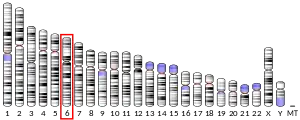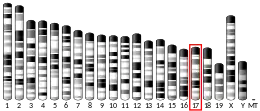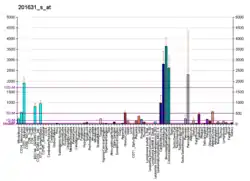IER3
Radiation-inducible immediate-early gene IEX-1 is a protein that in humans is encoded by the IER3 gene.[5][6]
| IER3 | |||||||||||||||||||||||||||||||||||||||||||||||||||
|---|---|---|---|---|---|---|---|---|---|---|---|---|---|---|---|---|---|---|---|---|---|---|---|---|---|---|---|---|---|---|---|---|---|---|---|---|---|---|---|---|---|---|---|---|---|---|---|---|---|---|---|
| Identifiers | |||||||||||||||||||||||||||||||||||||||||||||||||||
| Aliases | IER3, DIF-2, DIF2, GLY96, IEX-1, IEX-1L, IEX1, PRG1, immediate early response 3 | ||||||||||||||||||||||||||||||||||||||||||||||||||
| External IDs | OMIM: 602996 MGI: 104814 HomoloGene: 2894 GeneCards: IER3 | ||||||||||||||||||||||||||||||||||||||||||||||||||
| |||||||||||||||||||||||||||||||||||||||||||||||||||
| |||||||||||||||||||||||||||||||||||||||||||||||||||
| |||||||||||||||||||||||||||||||||||||||||||||||||||
| |||||||||||||||||||||||||||||||||||||||||||||||||||
| |||||||||||||||||||||||||||||||||||||||||||||||||||
| Wikidata | |||||||||||||||||||||||||||||||||||||||||||||||||||
| |||||||||||||||||||||||||||||||||||||||||||||||||||
This gene functions in the protection of cells from Fas- or tumor necrosis factor type alpha-induced apoptosis. Partially degraded and unspliced transcripts are found after virus infection in vitro, but these transcripts are not found in vivo and do not generate a valid protein.[7]
References
- GRCh38: Ensembl release 89: ENSG00000137331 - Ensembl, May 2017
- GRCm38: Ensembl release 89: ENSMUSG00000003541 - Ensembl, May 2017
- "Human PubMed Reference:". National Center for Biotechnology Information, U.S. National Library of Medicine.
- "Mouse PubMed Reference:". National Center for Biotechnology Information, U.S. National Library of Medicine.
- Kondratyev AD, Chung KN, Jung MO (May 1996). "Identification and characterization of a radiation-inducible glycosylated human early-response gene". Cancer Res. 56 (7): 1498–502. PMID 8603392.
- Wu MX, Ao Z, Prasad KV, Wu R, Schlossman SF (Aug 1998). "IEX-1L, an apoptosis inhibitor involved in NF-kappaB-mediated cell survival". Science. 281 (5379): 998–1001. Bibcode:1998Sci...281..998W. doi:10.1126/science.281.5379.998. PMID 9703517.
- "Entrez Gene: IER3 immediate early response 3".
Further reading
- Wu MX (2003). "Roles of the stress-induced gene IEX-1 in regulation of cell death and oncogenesis". Apoptosis. 8 (1): 11–8. doi:10.1023/A:1021688600370. PMID 12510147. S2CID 20935065.
- Maruyama K, Sugano S (1994). "Oligo-capping: a simple method to replace the cap structure of eukaryotic mRNAs with oligoribonucleotides". Gene. 138 (1–2): 171–4. doi:10.1016/0378-1119(94)90802-8. PMID 8125298.
- Schäfer H, Trauzold A, Siegel EG, et al. (1996). "PRG1: a novel early-response gene transcriptionally induced by pituitary adenylate cyclase activating polypeptide in a pancreatic carcinoma cell line". Cancer Res. 56 (11): 2641–8. PMID 8653710.
- Pietzsch A, Büchler C, Aslanidis C, Schmitz G (1997). "Identification and characterization of a novel monocyte/macrophage differentiation-dependent gene that is responsive to lipopolysaccharide, ceramide, and lysophosphatidylcholine". Biochem. Biophys. Res. Commun. 235 (1): 4–9. doi:10.1006/bbrc.1997.6715. PMID 9196025.
- Suzuki Y, Yoshitomo-Nakagawa K, Maruyama K, et al. (1997). "Construction and characterization of a full length-enriched and a 5'-end-enriched cDNA library". Gene. 200 (1–2): 149–56. doi:10.1016/S0378-1119(97)00411-3. PMID 9373149.
- Pietzsch A, Büchler C, Schmitz G (1998). "Genomic organization, promoter cloning, and chromosomal localization of the Dif-2 gene". Biochem. Biophys. Res. Commun. 245 (3): 651–7. doi:10.1006/bbrc.1998.8500. PMID 9588170.
- Schäfer H, Diebel J, Arlt A, et al. (1998). "The promoter of human p22/PACAP response gene 1 (PRG1) contains functional binding sites for the p53 tumor suppressor and for NFkappaB". FEBS Lett. 436 (2): 139–43. doi:10.1016/S0014-5793(98)01109-0. PMID 9781666. S2CID 28479652.
- Kobayashi T, Pittelkow MR, Warner GM, et al. (1998). "Regulation of a novel immediate early response gene, IEX-1, in keratinocytes by 1alpha,25-dihydroxyvitamin D3". Biochem. Biophys. Res. Commun. 251 (3): 868–73. doi:10.1006/bbrc.1998.9556. PMID 9791001.
- Kumar R, Kobayashi T, Warner GM, et al. (1999). "A novel immediate early response gene, IEX-1, is induced by ultraviolet radiation in human keratinocytes". Biochem. Biophys. Res. Commun. 253 (2): 336–41. doi:10.1006/bbrc.1998.9692. PMID 9878538.
- Schäfer H, Arlt A, Trauzold A, et al. (1999). "The putative apoptosis inhibitor IEX-1L is a mutant nonspliced variant of p22(PRG1/IEX-1) and is not expressed in vivo". Biochem. Biophys. Res. Commun. 262 (1): 139–45. doi:10.1006/bbrc.1999.1131. PMID 10448082.
- Feldmann KA, Pittelkow MR, Roche PC, et al. (2001). "Expression of an immediate early gene, IEX-1, in human tissues". Histochem. Cell Biol. 115 (6): 489–97. doi:10.1007/s004180100284. PMID 11455449. S2CID 24380294.
- Zhang Y, Schlossman SF, Edwards RA, et al. (2002). "Impaired apoptosis, extended duration of immune responses, and a lupus-like autoimmune disease in IEX-1-transgenic mice". Proc. Natl. Acad. Sci. U.S.A. 99 (2): 878–83. Bibcode:2002PNAS...99..878Z. doi:10.1073/pnas.022326699. PMC 117399. PMID 11782530.
- Im HJ, Pittelkow MR, Kumar R (2002). "Divergent regulation of the growth-promoting gene IEX-1 by the p53 tumor suppressor and Sp1". J. Biol. Chem. 277 (17): 14612–21. doi:10.1074/jbc.M109414200. PMC 2895739. PMID 11844788.
- Ohki R, Yamamoto K, Mano H, et al. (2002). "Identification of mechanically induced genes in human monocytic cells by DNA microarrays". J. Hypertens. 20 (4): 685–91. doi:10.1097/00004872-200204000-00026. PMID 11910304. S2CID 34968458.
- Im HJ, Craig TA, Pittelkow MR, Kumar R (2002). "Characterization of a novel hexameric repeat DNA sequence in the promoter of the immediate early gene, IEX-1, that mediates 1alpha,25-dihydroxyvitamin D(3)-associated IEX-1 gene repression". Oncogene. 21 (23): 3706–14. doi:10.1038/sj.onc.1205450. PMID 12032839.
- Garcia J, Ye Y, Arranz V, et al. (2002). "IEX-1: a new ERK substrate involved in both ERK survival activity and ERK activation". EMBO J. 21 (19): 5151–63. doi:10.1093/emboj/cdf488. PMC 129026. PMID 12356731.
- Strausberg RL, Feingold EA, Grouse LH, et al. (2003). "Generation and initial analysis of more than 15,000 full-length human and mouse cDNA sequences". Proc. Natl. Acad. Sci. U.S.A. 99 (26): 16899–903. Bibcode:2002PNAS...9916899M. doi:10.1073/pnas.242603899. PMC 139241. PMID 12477932.
This article is issued from Wikipedia. The text is licensed under Creative Commons - Attribution - Sharealike. Additional terms may apply for the media files.




